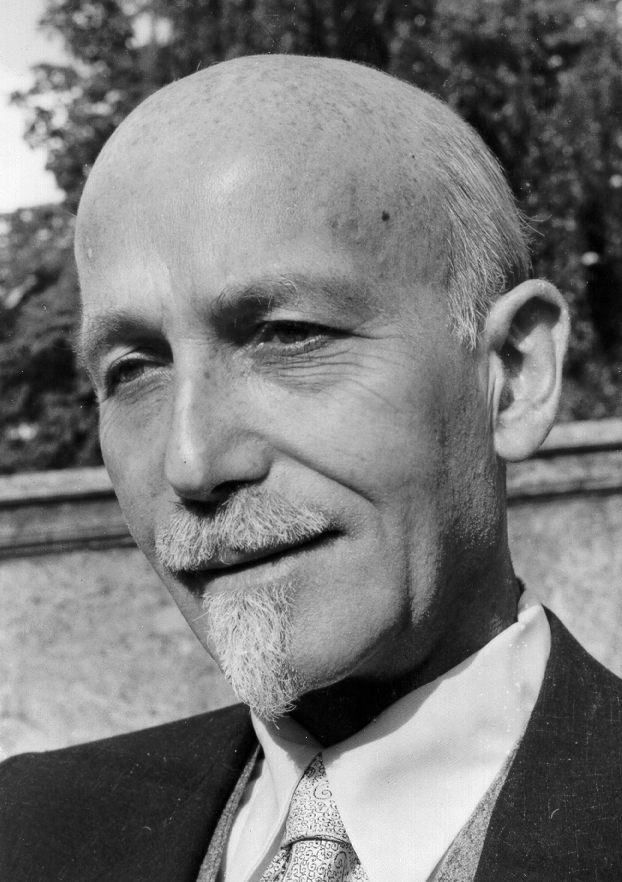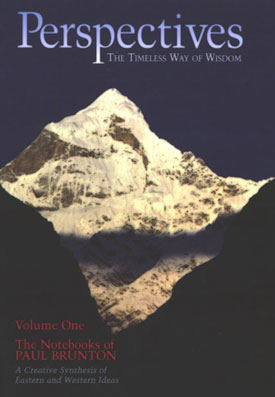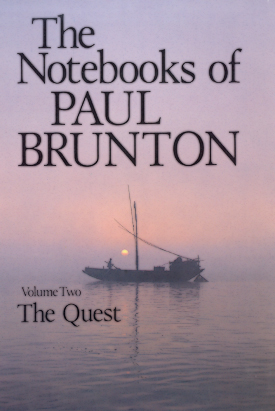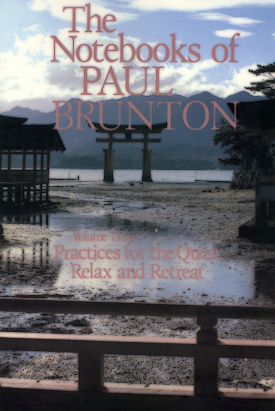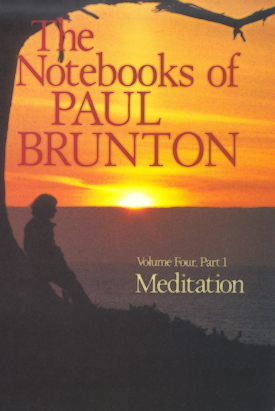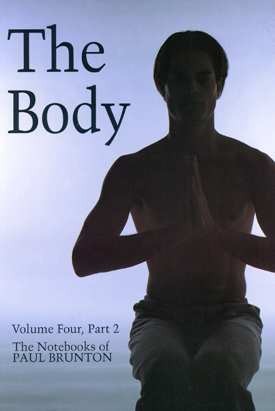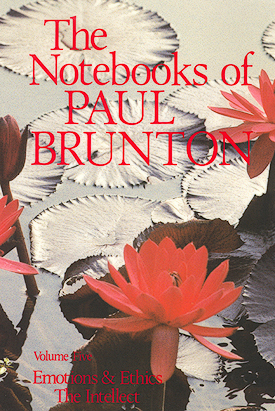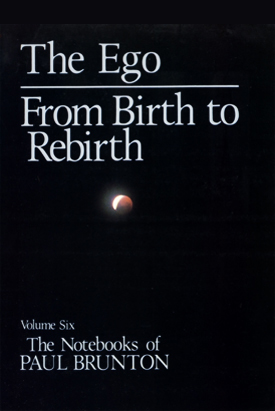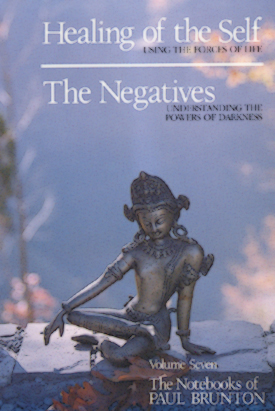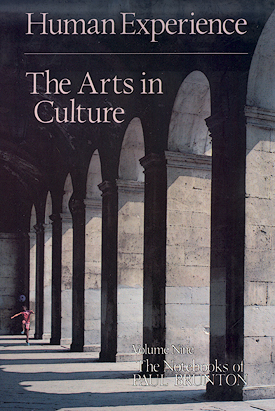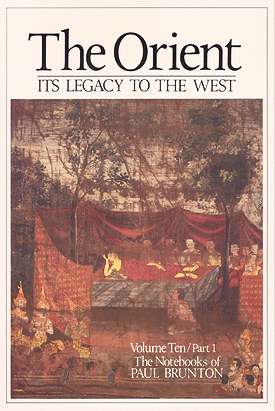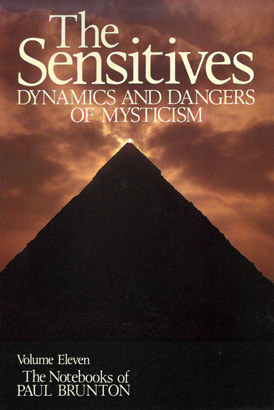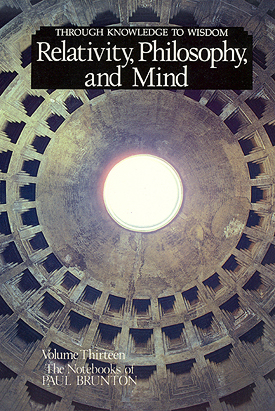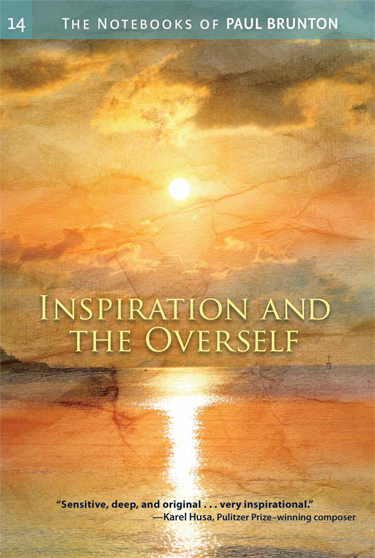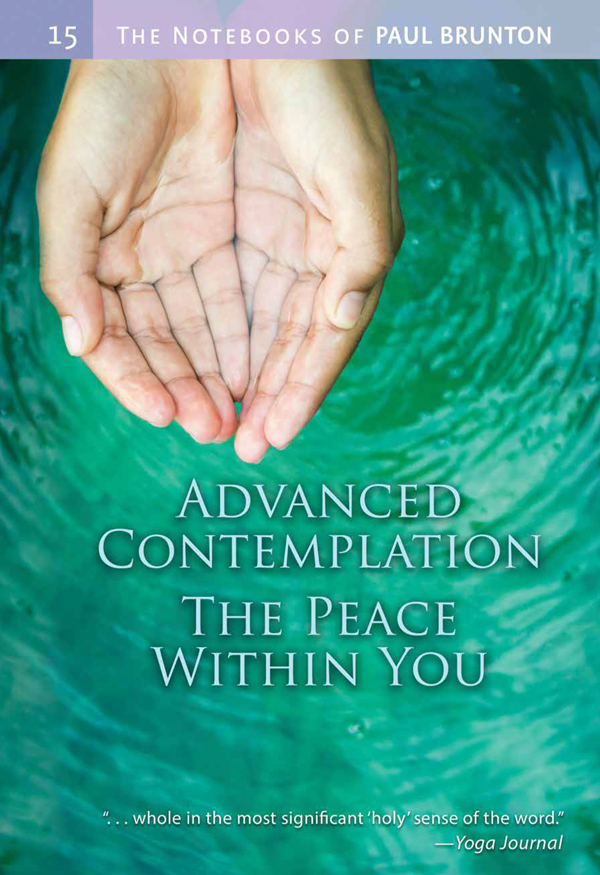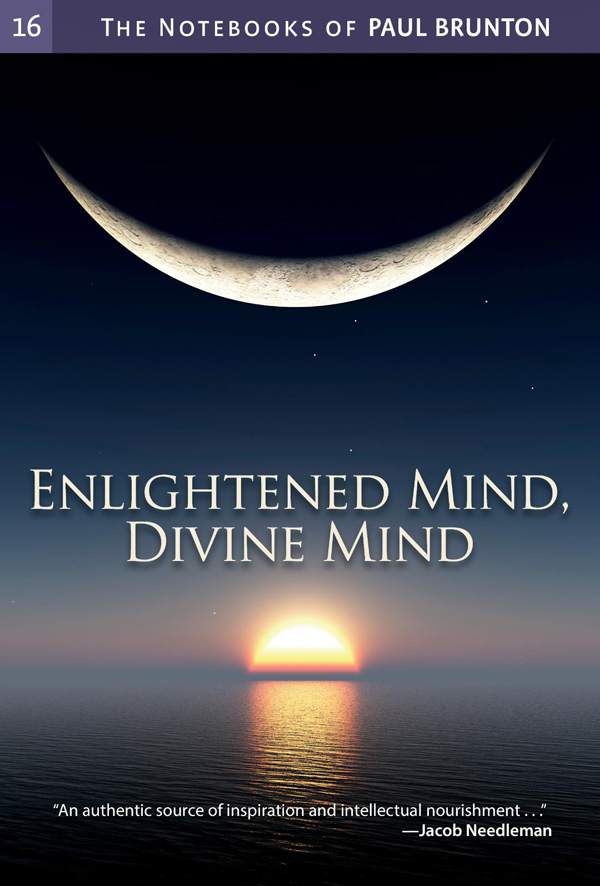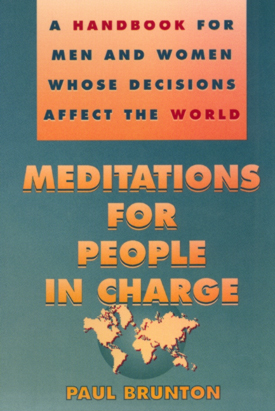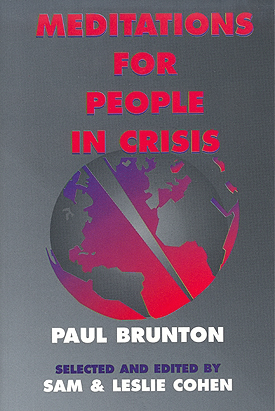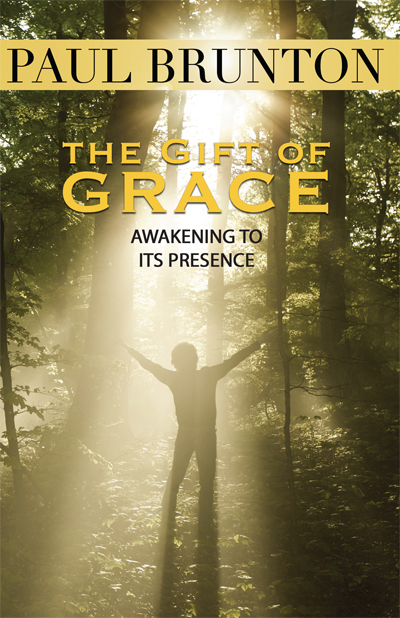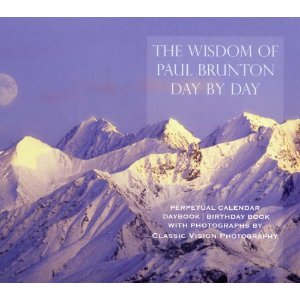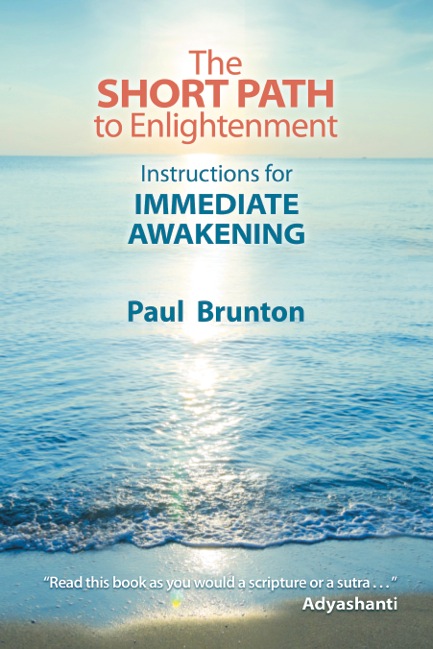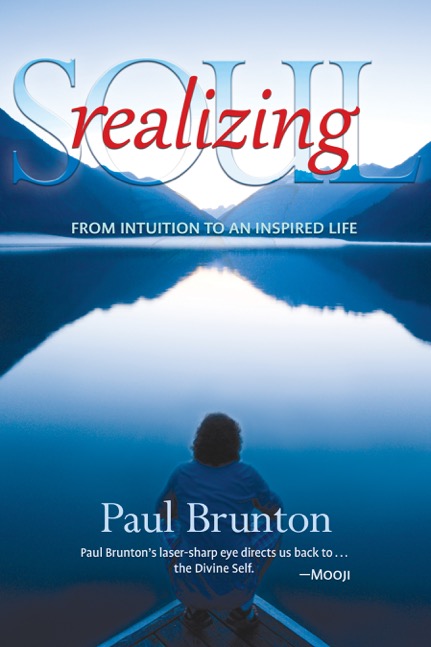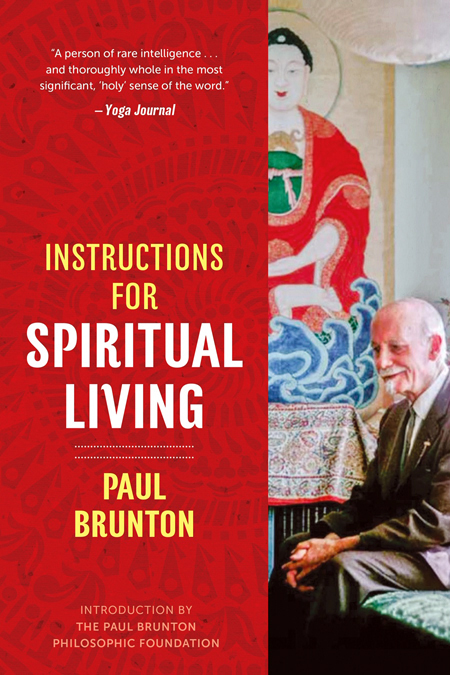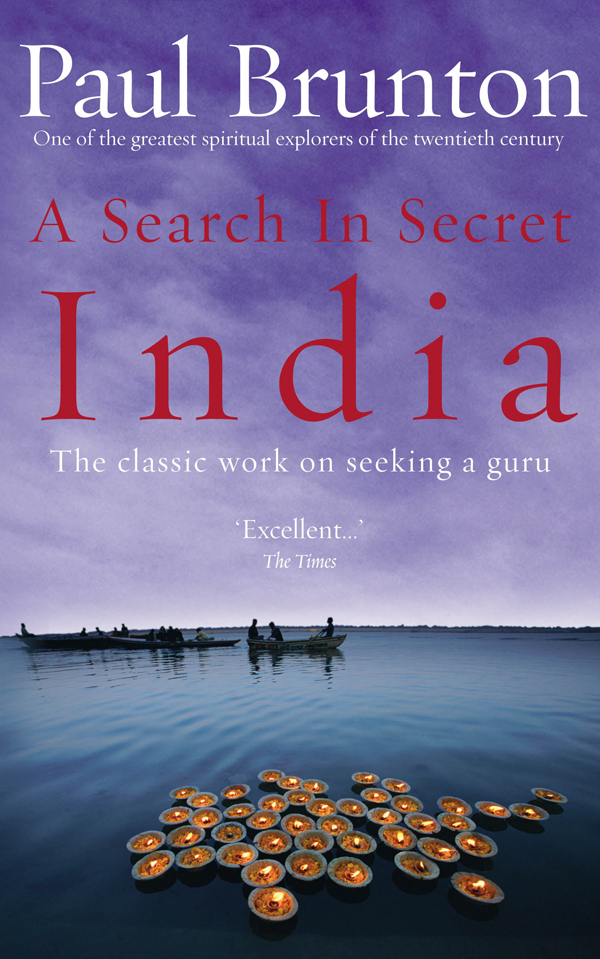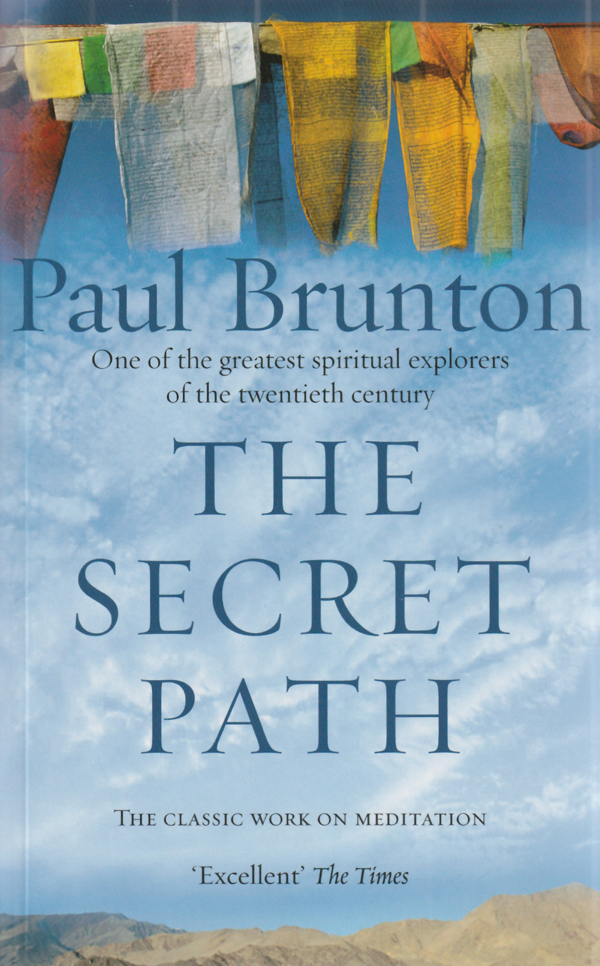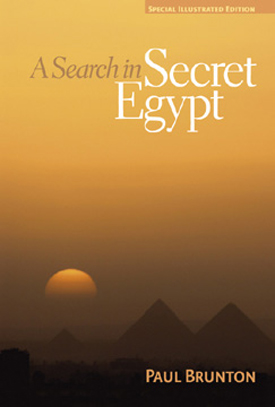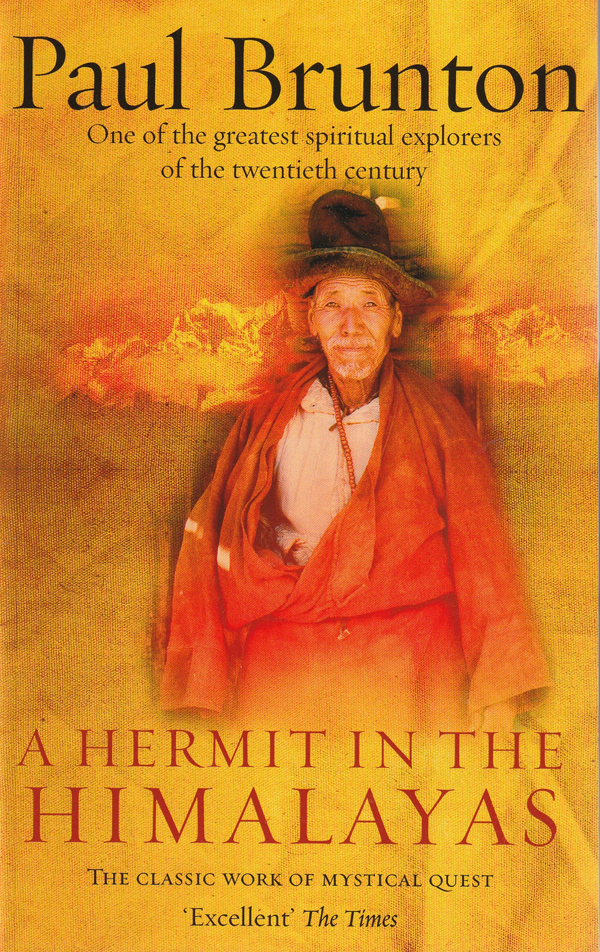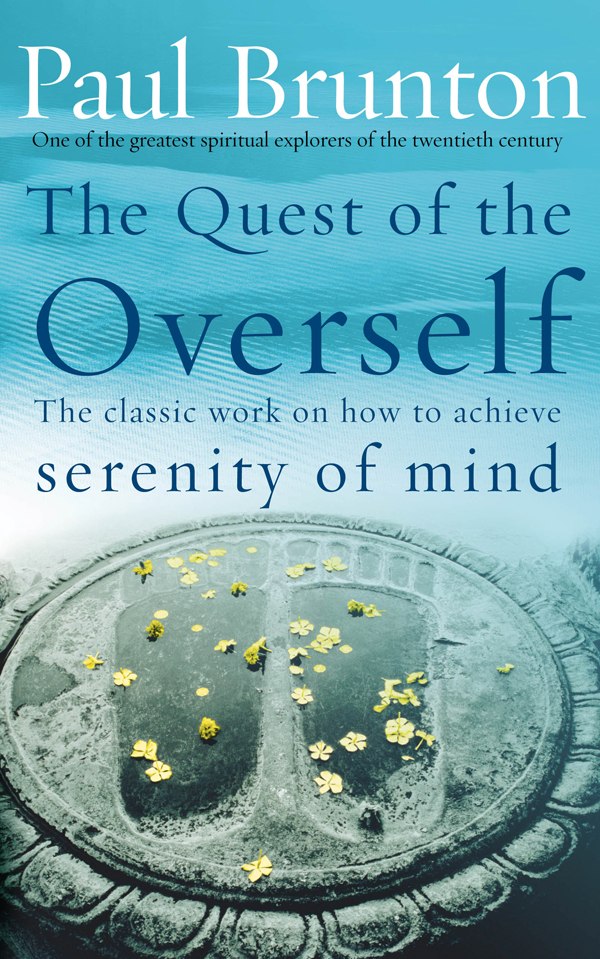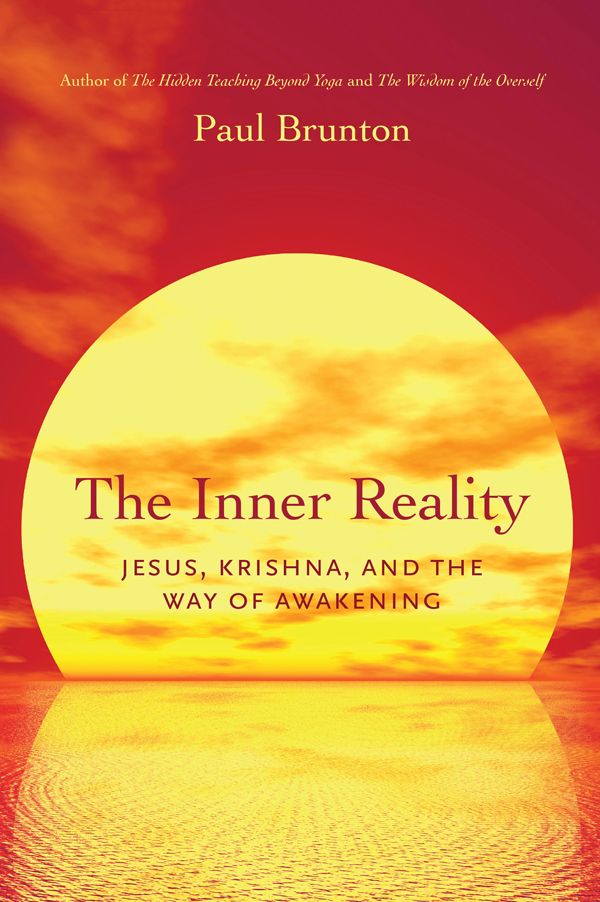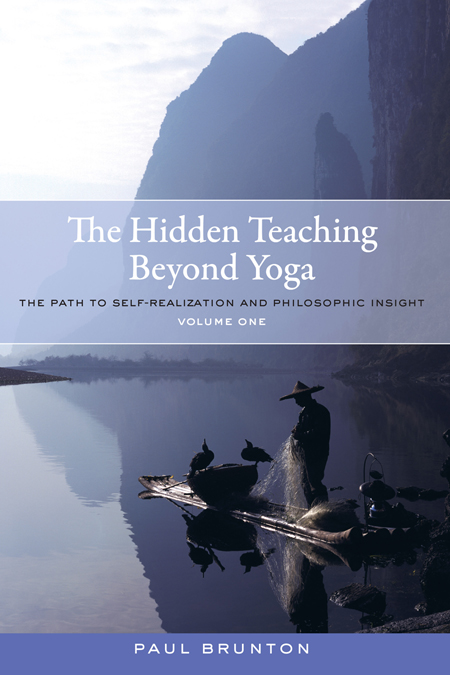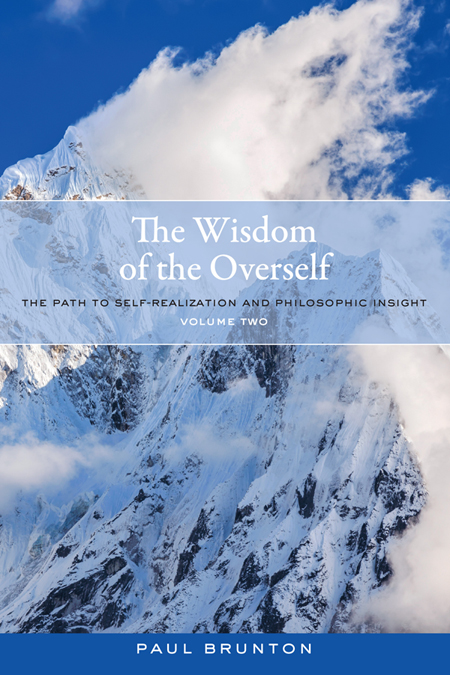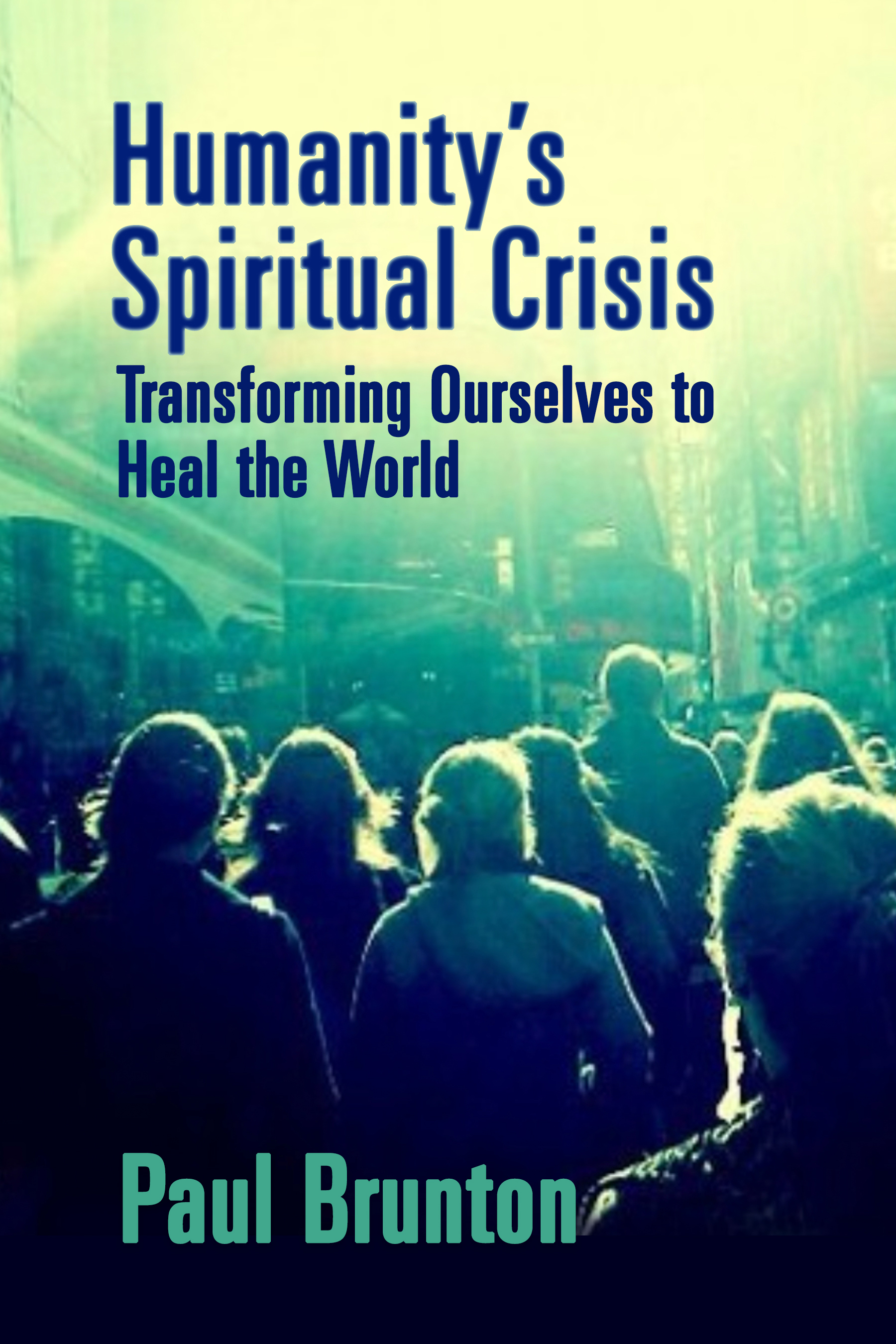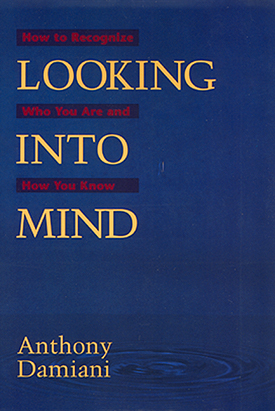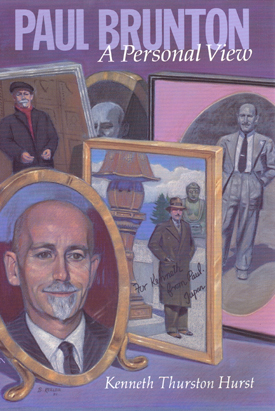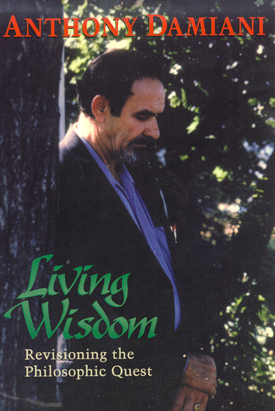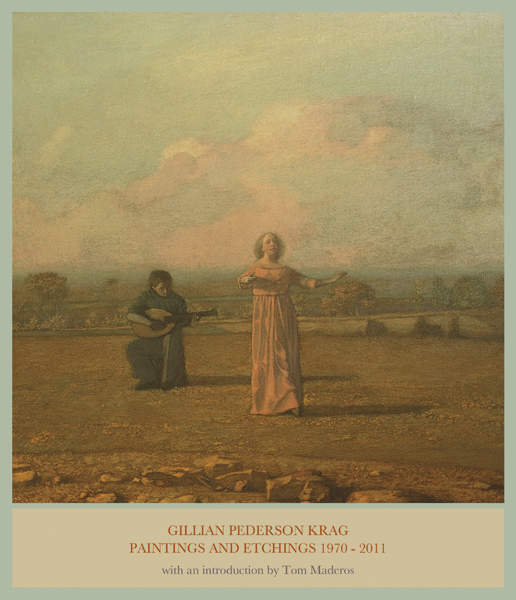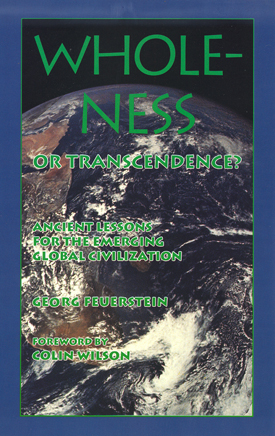The Notebooks of Paul Brunton volume 12
The Religious Urge
Reverential Life By Paul Brunton
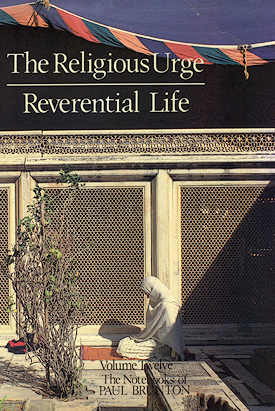
Retail/cover price: $16.95
Our price : $13.56
(You save $3.39!)
About this book:
The Notebooks of Paul Brunton volume 12
The Religious Urge
Reverential Life
by Paul Brunton
This volume focuses on how to venerate the source of life at all levels of life. It distinguishes the heart's religious instinct from outer religious forms and provides many ways to commune with the Sacred.
Subjects: Spirituality, Religion
5.75 x 8.5, softcover
(hardcover is available)
384 pages
ISBN 10: 0-943914-34-5
ISBN 13: 978-0-943914-37-4
Book Details
Part 1, The Religious Urge, carefully distinguishes the heart's ineradicable religious instinct from cultural trappings and conventional religious forms. It also evaluates services and disservices of institutional religion and points to ways in which the current spiritual impulse is likely to unfold.
Part 2, The Reverential Life, gives an individualized, practical approach to honest communion with the sacred through intelligent devotion, reverence, prayer, and mature humility. It features a section on what Grace is, and how it can open us to the sacredness of each moment of life.
Category Seventeen: THE RELIGIOUS URGE
INTRODUCTION
1. ORIGIN, PURPOSE OF RELIGIONS
Introductory
On evaluating religion
Prophets and messengers
Purpose of popular (mass) religion
On diversity in religion
On choosing one's religion
Grading teaching to capacity
2. ORGANIZATION, CONTENT OF RELIGION
Clergy
Church and State
Religious symbols
Places of worship
Ceremonies and rituals
Relics
Scriptures
Conceptions of God
3. RELIGION AS PREPARATORY
Doubt
Inner worship is superior
Mysticism and religion
4. PROBLEMS OF ORGANIZED RELIGION
On criticism and scepticism
Cycles of inspiration, decay
Accretions, distortion, corruption
Sectarianism
Intolerance, narrowness, persecution
Superstition
Dogma
Institutionalism, exploitation
5. COMMENTS ON SPECIFIC RELIGIONS
Ancient religions
Bahaism
Buddhism
Christianity
Hinduism
Islam
Jainism
Judaism
6. PHILOSOPHY AND RELIGION
Differences, similarities among religions
Comparative study, practice
Philosophy completes religion
Philosophy and "the faithful"
Intolerance toward philosophy
Philosophic independence, universalism
7. BEYOND RELIGION AS WE KNOW IT
Category Eighteen: THE REVERENTIAL LIFE
INTRODUCTION
1. DEVOTION
The greatest love
Warnings and suggestions
2. PRAYER
Forms of prayer
Misunderstandings and misuses
Human petition, divine response
3. HUMILITY
The need
The practice
4. SURRENDER
Avoid self-deception
Accept responsibility
The process
Its effect
5. GRACE
Its transmission
Karma and forgiveness
The power of the Other
The significance of self-effort
Preparing for grace
The mysterious presence
“. . . a veritable treasure-trove of philosophic-spiritual wisdom.” —Elisabeth Kubler-Ross
“. . . sensible and compelling. His work can stand beside that of such East-West bridges as Merton, Huxley, Suzuki, Watts, and Radhakrishnan. It should appeal to anyone concerned personally and academically with issues of spirituality.” —Choice
“Vigorous, clear-minded and independent . . . a synthesis of Eastern mysticism and Western rationality. . . A rich volume.” —Library Journal
“. . . a great gift to us Westerners who are seeking the spiritual.” —Charles T. Tart
“A person of rare intelligence. . . thoroughly alive, and whole in the most significant, 'holy' sense of the word.” —Yoga Journal
For more reviews of the Notebooks series, click here
EDITORS' INTRODUCTION for category 17, The Religious Urge
The Religious Urge distinguishes the heart's ineradicable religious instinct from traditional religious forms, and clarifies the services and disservices of institutional religion. It stresses that fulfilling the religious instinct is an essential step toward the attainment of wholeness, and that this step may or may not involve the rituals and teachings of an established religious organization.
With broad tolerance and critical insight, The Religious Urge speaks directly to the individuating modern mentality. It welcomes the diversity in religion and acknowledges, with profound gratitude, the invaluable services of inspired spiritual teachers throughout the world's history and in the contemporary scene. But at the same time, it fully sympathizes with those for whom institutional religion has become an oppressive cause of fruitless conflict. It will be useful to those struggling to re-establish reliable religious values, to those struggling for freedom from religious systems that have become stifling, to those who overvalue religion, and to those who undervalue it.
As throughout his writings, P.B. here discusses religion as the most elementary of three levels of spiritual development, succeeded in turn by the practice of mysticism and by the study and practice of mystical philosophy. A key point of this section, however, is that we should not take "most elementary'' to mean "least important.'' Rather, we should see a complete activation and integration of the religious instinct as our most fundamental resource when exploring the nature of self and world. A proper integration of this instinct, in its mature form, is essential to the establishing of a correct relationship between the ego and the divine individuality.
A final introductory remark on this section concerns the fifth chapter. Readers for whom this volume is a first contact with P.B.'s writing should not be misled by the fact that most of the paras on specific religions address Christianity. It appears that this section was so weighted because it was intended primarily for an audience whose religious experience has been with and through Christianity. Material on a variety of other religions runs throughout The Notebooks, especially in category fifteen, The Orient.
Editorial conventions here are the same as stated in the introductions to Perspectives and The Quest. Likewise, (P) at the end of a para indicates that it also appears in Perspectives, the introductory volume to this series.
EDITORS' INTRODUCTION for category 18, The Reverential Life
The Reverential Life focuses on the development of our relationship to the divine through the feeling function. It gives an individualized, practical approach to honest communion with the Sacred through intelligent prayer, rational devotion, and informed, mature humility. A wonderful resource of aspirations, devotions, and practical techniques for reducing the ego's obstructive arrogance, it is first a section to be drawn upon for inspiration and only secondarily a text to be studied.
Because this section addresses primarily the feelings, we suggest that the reader begin by reading randomly until a para catches the attention; then pause, let the idea or suggestion sink in. Continue reading in this fashion until a mood of reverence, reflection, or aspiration awakens. In this way, the reading will be a good preface to one's meditation period. Done regularly and over a period of time, the depth and power of the insight behind these little paras will begin to have a positive effect on the meditations and in daily living.
The feeling function, by its own nature, learns in a cyclic rather than linear fashion. Only through creative repetition are the feelings transformed from the level of unreflective emotions to that of the subtlest sensitivity to Spirit. The way we learn to appreciate music, or a particular piece of music, illustrates this principle. For this reason, frequent small and inspiring doses of the material in this section may prove very helpful to the quester's daily practice. As the material becomes more familiar and certain questions naturally arise, or if there is a desire to concentrate on a specific practice--of prayer or devotion or humility or surrender — then the organization of the paras into specialized groups will be helpful.
One theme that runs throughout this material is the double standpoint of the ego and the higher self. What role does self-effort have in evoking Grace? Can the ego really teach itself humility? Can it really surrender without the help of Grace? P.B. addresses each of these themes from a mystical perspective in the earlier chapters, and then from the viewpoint of philosophy in the final chapter on Grace. The double standpoint is developed further in categories nineteen and twenty and discussed more in the introduction to volume 13.
Editorial conventions here are the same as stated in the introductions to Perspectives and The Quest. Likewise, (P) at the end of a para indicates that it also appears in Perspectives, the introductory volume to this series.
Excerpts from Notebooks category seventeen, The Religious Urge:
PREFATORY
The essence of religion does not consist in dogma and ritual but in faith in a higher power, worship of that higher power, and moral purification to come closer to it.
One of the Commandments warns men not to take the name of God in vain. The simple and obvious and usually accepted meaning of this is not to utter the word "God" without seriousness and reverence. But the truer meaning is not to talk of religion — and especially of attending places of religious worship — while avoiding the effort involved in seeking a truly religious experience.
From chapter 1: ORIGIN, PURPOSE OF RELIGIONS
Introductory
1
Religion should provide a passage along the journey to reality and not a prison for the aspiring soul.
2
Although religion is only the beginning of the quest — the first form which a recognition of the existence of a higher power takes — it would be an error to believe that it is only for the simpler types of person, that worship of this power, that the attitude of reverential devotion which it engenders, is not for more developed and also more educated minds. It is for all.
3
It would be a mistake to believe that because his search will lead him beyond religion, therefore religion is to be thrown aside. It would be more than a mistake: it would imperil his whole quest.
4
Men seek for God because they cannot help themselves. They endure tribulations and make sacrifices in this search because they love God. And the source of this driving urge lies in the tremendous contradiction between what they pathetically are and what they intuitively feel they ought to be.
5
The strength of religion does not come from the strength of popular ignorance or popular superstition. It comes from the innate need of every human creature to worship its source. The religious instinct cannot be killed.
6
Whether in the mosques of Islam or the tabernacles of Israel, the instinct which makes man acknowledge that there is some Power behind it all is an authentic instinct.
From chapter 3: RELIGION AS PREPARATORY
1
The religious life, if earnestly followed and conscientiously sustained, carries the devotee only part of the way towards worship of, and communion with, God. It is only a preparatory school. For both morally and intellectually it is a kind of compromise, yielding to a certain degree of the lower nature's rule and accepting beliefs that violate reason. This satisfies him only because he has not made perfect purity and perfect truth his standards.
2
To deny the immense value of the ordinary religion in its own place and to those who have yet to gain its rewards would be to break off the lower rungs of the ladder whereby men must climb to what is the ultimate goal of all religion.
3
The general line of inner development for the human race is in the first stage right action, which includes duty, service, responsibility. In the second stage religious devotion appears. This engenders worship of the higher power, moral improvement, holy communion. The third stage is mystical and involves practice of meditation to get a more intimate communion. The fourth stage is the awakening of need to understand truth and know reality. Its completed product is the sage, who includes in himself the civilized man, the religionist, the mystic, and the philosopher.(P)
4
Organizations are for most people the only way of receiving religious help or acquiring religious belief. This, however, does not mean that they will always remain so, for a time comes when they are seen for what they are — elementary stages usually, intermediary stages sometimes.
5
When a man comes to the attitude that it is not sufficient for him to receive religion at second hand as a creed or a conviction, when he must receive it directly as an actual experience in his own life, when he can pray with Flemish Thomas à Kempis, "Let it not be Moses or the Prophets that speak to me, but speak thyself," he is ready to move up from the first and lowest grade to the second and middle one. Such a one will then put himself in a position — which he did not occupy before — of being able to move forward to the central point of all religion, which is the personal revelation of the Overself, God's Deputy, in the heart of the individual man.
From chapter 4: PROBLEMS OF ORGANIZED RELIGION
On criticism and scepticism
1
The criticism of religious truths arises not only out of its confusion of pure religion with ecclesiastical religion, but, in the case of other persons, out of a low character rather than a lofty ideal. It is then destructive and unscrupulous, taking meanings and deliberately distorting them to suit its own purposes. It is then sincere only in its selfishness and adequate only in its materialism, not only seeking all the defects of the attitude it proposes to replace but also inventing many imaginary ones. It lives by criticism and feeds on conflict. It cunningly entraps those who are so troubled by present world conditions as to have lost hope, enthusiasm, courage, and faith on the one hand, and on the other those who are so troubled by these conditions as to have become unbalanced, violent, irrational, and cruel. To both, the phraseology of conventional religion, politics, society, and economics has become hollow. To both, the feebleness and foolishness of our entire social structure have become apparent. But both are wrong.
2
Unfair and untrue criticism by sceptics may well be ignored, but too often in the past religions have failed to benefit themselves by looking into justifiable criticism from believers. This failure has strengthened superstition and weakened real religion.
3
Instead of being vexed over the rise of scepticism and indifference or grieved over the fall of religious influence, they should seek the causes and adjust faith to reason and truth.
4
If a teaching can make a man more hopeful when accepted, more peaceful when studied, and more intuitive when applied, then it deserves respect, not scorn.
5
When we speak here of the dangers of atheism and the darkness of materialism, we do not refer to those brave, intelligent men who have protested against superstitious religions and pious exploitation. That which they opposed was not genuine religion at all, but the satanic pretense of it. It is an historic and unfortunate fact that such pretense is too often successful.
6
Every man who receives the Life-Force from his inner being yet denies its existence, who is sustained by the Overself's power yet decries those who bear witness to it, sins against the Holy Ghost. This is the real meaning of that mysterious sentence in the New Testament which refers to such a sin.
Excerpts from Notebooks category eighteen, The Reverential Life:
PREFATORY
He who sits with humbled, bowed head and folded, clasped, or knees-rested hands, with mind and heart in awed reverence, in sincere, worshipful, and rapt absorption which is aware of nothing else than the divine presence - he is praying, is meditating, is worshipping, is in heaven already.
From chapter 1: DEVOTION
1
All living forms everywhere embody this principle of being - the One Infinite Life-Power. It is not itself personal yet it is open to man's personal access and will respond to his invocation — provided he succeeds in establishing contact with it and provided his approach is right - but its response must come in its own way and time.
2
The devotional element belongs as much to this quest as to any other. Adoration of the divine soul and humility in the divine presence are two necessary qualities which the quester ought to develop. The first is expressed through meditation and the second through prayer.
3
Look how the smaller birds greet the sun, with so much merry chirruping and so much outpouring of song! It is their way of expressing worship for the only Light they can know, an outer one. But man can also know the inner Sun, the Light of the Overself. How much more reason has he to chirp and sing than the little birds! Yet how few men feel gratitude for such privilege.(P)
4
Why ought I to cultivate religious faith, feeling worship? Because it lifts up the feeling nature generally. Because it develops humility. Because it invites Grace. Because it is the duty of a human being in relation to its Source.
5
Krishna, in the Bhagavad Gita, is the individual's own higher self. He must keep his inner shrine within the heart reserved for the Ideal. He should worship there the Spirit that is birthless and deathless, indestructible and divine. Life in this world is like foam on the sea: it passes all too soon; but the moments given in adoration and obeisance to the Soul count for eternal gain. The most tremendous historic happenings on this earth are, after all, only pictures that pass through consciousness like a dream. Once the seeker awakens to the Real, he sees them for what they are. Then he will live in Its serenity, and it will no longer matter if the pictures themselves are stormy and agitated. It is the greatest good fortune to attain such serenity — to be lifted above passion and hatred, prejudice and fear, greed and discontent, and yet to be able to attend effectively and capably to one's worldly duties. It is possible to reach this state. The seeker may have had glimpses of it already. Someday, sometime, if he is patient, he will enter it to stay — and the unimaginably rewarding and perfect purpose of his life, of all his lifetimes, will be fulfilled.
From chapter 5: GRACE
1
Grace is a cosmic fact. If it were not, then the spiritual outlook for the human race, dependent entirely on its own efforts for the possibility of spiritual progress, would be poor and disheartening.
2
Grace is the indrawing power, or inward pull, of Overself, which, being itself ever-present, guarantees the ever-presence of Grace.
3
There is either great ignorance or grave confusion as regards grace, some serious errors and many smaller ambiguities. There is need to understand exactly what it is, the principal forms it takes, how to recognize its presence, and how its workings show themselves.
4
Grace is the benign effluence of the Overself, the kindly radiation from it, ever-present in us. The theological use of this term to mean particular help given by God to man to enable him to endure temptation and act rightly is a serious and arbitrary narrowing down of its original meaning. It may mean this sometimes, but it also means the loving mercy God shows to man, which appears variously as enlightenment of the mind or relief of the heart, as change of outward physical conditions or a dynamic revolution-working energy acting on the aspirant or on his life.
5
Out of the grand mystery of the Overself, the first communication we receive telling us of and making us feel its existence, is Grace.
6
The rejection of the idea of Grace is based on a misconception of what it is, and especially on the belief that it is an arbitrary capricious gift derived from favouritism. It is, of course, nothing of the kind, but rather the coming into play of a higher law. Grace is simply the transforming power of the Overself which is ever-present but which is ordinarily and lawfully unable to act in a man until he clears away the obstacles to this activity. If its appearance is considered unpredictable, that is because the karmic evil tendencies which hinder this appearance vary considerably from one person to another in strength, volume, and length of life. When the karma which generated them becomes weak enough, they can no longer impede its action.(P)
7
By grace I mean the manifestation of God's friendliness.(P)
8
The Overself extends its grace to all men, but all not men are able to get it. This may be due to different reasons, some physical and others, the most numerous, emotional or mental.
In his own words:
“Writing, which is an exercise of the intellect to some, is an act of worship to me. I rise from my desk in the same mood as that in which I leave an hour of prayer in an old cathedral, or of meditation in a little wood . . .” —from Perspectives, volume 1 in The Notebooks of Paul Brunton, p. 143
“P.B. as a private person does not count. There are hundreds of millions of such persons anyway. What is one man and his quest? P.B.’s personal experiences and views are not of any particular importance or special consequence. What happens to the individual man named P.B. is a matter of no account to anyone except himself. But what happens to the hundreds of thousands of spiritual seekers today who are following the same path that he pioneered is a serious matter and calls for prolonged consideration. Surely the hundreds of thousands of Western seekers who stand behind him and whom indeed, in one sense, he represents, do count. P.B. as a symbol of the scattered group of Western truth-seekers who, by following his writings so increasingly and so eagerly, virtually follow him also, does count. He personifies their aspirations, their repulsion from materialism and attraction toward mysticism, their interest in Oriental wisdom and their shepherdless state. As a symbol of this Western movement of thought, he is vastly greater than himself. In his mind and person the historic need for a new grasp of the contemporary spiritual problem found a plain-speaking voice . . .” —from Perspectives, volume 1 in The Notebooks of Paul Brunton, p. 145
Learn more about Paul Brunton through articles at the Paul Brunton Philosophic Foundation web site
Electronic versions of this book are available from all major (Amazon Kindle, Barnes & Noble, Apple, Kobo, etc.) and most smaller ebook vendors. Please don't try to order ebooks directly from us, as we are not yet able to deliver anything to you in a preferred electronic format.
To see all our Paul Brunton titles, scroll down to The Complete Paul Brunton Opus below.
To see and/or order individual volumes in The Notebooks of Paul Brunton, hover your mouse over the specific cover in the Notebooks section of Complete Paul Brunton Opus below, then click on Details in the box that appears within it.
Click here to see or order the complete set of The Notebooks of Paul Brunton.
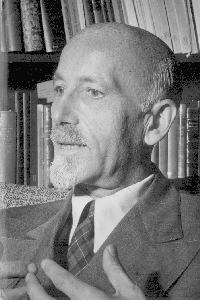
Paul Brunton helps us hear the melody behind the medley of today's "spiritual marketplace." His late writings raise the bar for what we can expect of spiritual teachings and teachers, and what we can do for ourselves. Born in London in 1898, he soon became a leading pioneer of much of what we now take for granted. He traveled widely throughout the world (long before it was fashionable) to meet living masters of various traditions with whom he then lived and studied. His eleven early books from 1934–1952 shared much of what he learned, and helped set the stage for dramatic east-west exchanges of the late 20th century. Paul Brunton left more than 10,000 pages of enormously helpful new work in notebooks he reserved for posthumous publication, much of which is now available as The Notebooks of Paul Brunton. See "The Complete Paul Brunton Opus" in blue below to see his many works available on this site. You can also search on Paul Brunton in the search bar to browse the selections, or click on a link below for specific connections.
Click here for an article about Paul Brunton.
Click here for The Notebooks of Paul Brunton.
To access small theme-based books compiled from Paul Brunton's writings, scroll down to Derived from the Notebooks below.
To access Paul Brunton's early writings, published from 1934–1952, scroll down to Paul Brunton's Early Works below.
To access commentaries on Paul Brunton and his work by his leading student, Anthony Damiani, as well as other writings about Paul Brunton and/or his work, scroll down to Commentaries and Reflections on Paul Brunton and His Work below.
Book Details
Part 1, The Religious Urge, carefully distinguishes the heart's ineradicable religious instinct from cultural trappings and conventional religious forms. It also evaluates services and disservices of institutional religion and points to ways in which the current spiritual impulse is likely to unfold.
Part 2, The Reverential Life, gives an individualized, practical approach to honest communion with the sacred through intelligent devotion, reverence, prayer, and mature humility. It features a section on what Grace is, and how it can open us to the sacredness of each moment of life.
Category Seventeen: THE RELIGIOUS URGE
INTRODUCTION
1. ORIGIN, PURPOSE OF RELIGIONS
Introductory
On evaluating religion
Prophets and messengers
Purpose of popular (mass) religion
On diversity in religion
On choosing one's religion
Grading teaching to capacity
2. ORGANIZATION, CONTENT OF RELIGION
Clergy
Church and State
Religious symbols
Places of worship
Ceremonies and rituals
Relics
Scriptures
Conceptions of God
3. RELIGION AS PREPARATORY
Doubt
Inner worship is superior
Mysticism and religion
4. PROBLEMS OF ORGANIZED RELIGION
On criticism and scepticism
Cycles of inspiration, decay
Accretions, distortion, corruption
Sectarianism
Intolerance, narrowness, persecution
Superstition
Dogma
Institutionalism, exploitation
5. COMMENTS ON SPECIFIC RELIGIONS
Ancient religions
Bahaism
Buddhism
Christianity
Hinduism
Islam
Jainism
Judaism
6. PHILOSOPHY AND RELIGION
Differences, similarities among religions
Comparative study, practice
Philosophy completes religion
Philosophy and "the faithful"
Intolerance toward philosophy
Philosophic independence, universalism
7. BEYOND RELIGION AS WE KNOW IT
Category Eighteen: THE REVERENTIAL LIFE
INTRODUCTION
1. DEVOTION
The greatest love
Warnings and suggestions
2. PRAYER
Forms of prayer
Misunderstandings and misuses
Human petition, divine response
3. HUMILITY
The need
The practice
4. SURRENDER
Avoid self-deception
Accept responsibility
The process
Its effect
5. GRACE
Its transmission
Karma and forgiveness
The power of the Other
The significance of self-effort
Preparing for grace
The mysterious presence
“. . . a veritable treasure-trove of philosophic-spiritual wisdom.” —Elisabeth Kubler-Ross
“. . . sensible and compelling. His work can stand beside that of such East-West bridges as Merton, Huxley, Suzuki, Watts, and Radhakrishnan. It should appeal to anyone concerned personally and academically with issues of spirituality.” —Choice
“Vigorous, clear-minded and independent . . . a synthesis of Eastern mysticism and Western rationality. . . A rich volume.” —Library Journal
“. . . a great gift to us Westerners who are seeking the spiritual.” —Charles T. Tart
“A person of rare intelligence. . . thoroughly alive, and whole in the most significant, 'holy' sense of the word.” —Yoga Journal
For more reviews of the Notebooks series, click here
EDITORS' INTRODUCTION for category 17, The Religious Urge
The Religious Urge distinguishes the heart's ineradicable religious instinct from traditional religious forms, and clarifies the services and disservices of institutional religion. It stresses that fulfilling the religious instinct is an essential step toward the attainment of wholeness, and that this step may or may not involve the rituals and teachings of an established religious organization.
With broad tolerance and critical insight, The Religious Urge speaks directly to the individuating modern mentality. It welcomes the diversity in religion and acknowledges, with profound gratitude, the invaluable services of inspired spiritual teachers throughout the world's history and in the contemporary scene. But at the same time, it fully sympathizes with those for whom institutional religion has become an oppressive cause of fruitless conflict. It will be useful to those struggling to re-establish reliable religious values, to those struggling for freedom from religious systems that have become stifling, to those who overvalue religion, and to those who undervalue it.
As throughout his writings, P.B. here discusses religion as the most elementary of three levels of spiritual development, succeeded in turn by the practice of mysticism and by the study and practice of mystical philosophy. A key point of this section, however, is that we should not take "most elementary'' to mean "least important.'' Rather, we should see a complete activation and integration of the religious instinct as our most fundamental resource when exploring the nature of self and world. A proper integration of this instinct, in its mature form, is essential to the establishing of a correct relationship between the ego and the divine individuality.
A final introductory remark on this section concerns the fifth chapter. Readers for whom this volume is a first contact with P.B.'s writing should not be misled by the fact that most of the paras on specific religions address Christianity. It appears that this section was so weighted because it was intended primarily for an audience whose religious experience has been with and through Christianity. Material on a variety of other religions runs throughout The Notebooks, especially in category fifteen, The Orient.
Editorial conventions here are the same as stated in the introductions to Perspectives and The Quest. Likewise, (P) at the end of a para indicates that it also appears in Perspectives, the introductory volume to this series.
EDITORS' INTRODUCTION for category 18, The Reverential Life
The Reverential Life focuses on the development of our relationship to the divine through the feeling function. It gives an individualized, practical approach to honest communion with the Sacred through intelligent prayer, rational devotion, and informed, mature humility. A wonderful resource of aspirations, devotions, and practical techniques for reducing the ego's obstructive arrogance, it is first a section to be drawn upon for inspiration and only secondarily a text to be studied.
Because this section addresses primarily the feelings, we suggest that the reader begin by reading randomly until a para catches the attention; then pause, let the idea or suggestion sink in. Continue reading in this fashion until a mood of reverence, reflection, or aspiration awakens. In this way, the reading will be a good preface to one's meditation period. Done regularly and over a period of time, the depth and power of the insight behind these little paras will begin to have a positive effect on the meditations and in daily living.
The feeling function, by its own nature, learns in a cyclic rather than linear fashion. Only through creative repetition are the feelings transformed from the level of unreflective emotions to that of the subtlest sensitivity to Spirit. The way we learn to appreciate music, or a particular piece of music, illustrates this principle. For this reason, frequent small and inspiring doses of the material in this section may prove very helpful to the quester's daily practice. As the material becomes more familiar and certain questions naturally arise, or if there is a desire to concentrate on a specific practice--of prayer or devotion or humility or surrender — then the organization of the paras into specialized groups will be helpful.
One theme that runs throughout this material is the double standpoint of the ego and the higher self. What role does self-effort have in evoking Grace? Can the ego really teach itself humility? Can it really surrender without the help of Grace? P.B. addresses each of these themes from a mystical perspective in the earlier chapters, and then from the viewpoint of philosophy in the final chapter on Grace. The double standpoint is developed further in categories nineteen and twenty and discussed more in the introduction to volume 13.
Editorial conventions here are the same as stated in the introductions to Perspectives and The Quest. Likewise, (P) at the end of a para indicates that it also appears in Perspectives, the introductory volume to this series.
Excerpts from Notebooks category seventeen, The Religious Urge:
PREFATORY
The essence of religion does not consist in dogma and ritual but in faith in a higher power, worship of that higher power, and moral purification to come closer to it.
One of the Commandments warns men not to take the name of God in vain. The simple and obvious and usually accepted meaning of this is not to utter the word "God" without seriousness and reverence. But the truer meaning is not to talk of religion — and especially of attending places of religious worship — while avoiding the effort involved in seeking a truly religious experience.
From chapter 1: ORIGIN, PURPOSE OF RELIGIONS
Introductory
1
Religion should provide a passage along the journey to reality and not a prison for the aspiring soul.
2
Although religion is only the beginning of the quest — the first form which a recognition of the existence of a higher power takes — it would be an error to believe that it is only for the simpler types of person, that worship of this power, that the attitude of reverential devotion which it engenders, is not for more developed and also more educated minds. It is for all.
3
It would be a mistake to believe that because his search will lead him beyond religion, therefore religion is to be thrown aside. It would be more than a mistake: it would imperil his whole quest.
4
Men seek for God because they cannot help themselves. They endure tribulations and make sacrifices in this search because they love God. And the source of this driving urge lies in the tremendous contradiction between what they pathetically are and what they intuitively feel they ought to be.
5
The strength of religion does not come from the strength of popular ignorance or popular superstition. It comes from the innate need of every human creature to worship its source. The religious instinct cannot be killed.
6
Whether in the mosques of Islam or the tabernacles of Israel, the instinct which makes man acknowledge that there is some Power behind it all is an authentic instinct.
From chapter 3: RELIGION AS PREPARATORY
1
The religious life, if earnestly followed and conscientiously sustained, carries the devotee only part of the way towards worship of, and communion with, God. It is only a preparatory school. For both morally and intellectually it is a kind of compromise, yielding to a certain degree of the lower nature's rule and accepting beliefs that violate reason. This satisfies him only because he has not made perfect purity and perfect truth his standards.
2
To deny the immense value of the ordinary religion in its own place and to those who have yet to gain its rewards would be to break off the lower rungs of the ladder whereby men must climb to what is the ultimate goal of all religion.
3
The general line of inner development for the human race is in the first stage right action, which includes duty, service, responsibility. In the second stage religious devotion appears. This engenders worship of the higher power, moral improvement, holy communion. The third stage is mystical and involves practice of meditation to get a more intimate communion. The fourth stage is the awakening of need to understand truth and know reality. Its completed product is the sage, who includes in himself the civilized man, the religionist, the mystic, and the philosopher.(P)
4
Organizations are for most people the only way of receiving religious help or acquiring religious belief. This, however, does not mean that they will always remain so, for a time comes when they are seen for what they are — elementary stages usually, intermediary stages sometimes.
5
When a man comes to the attitude that it is not sufficient for him to receive religion at second hand as a creed or a conviction, when he must receive it directly as an actual experience in his own life, when he can pray with Flemish Thomas à Kempis, "Let it not be Moses or the Prophets that speak to me, but speak thyself," he is ready to move up from the first and lowest grade to the second and middle one. Such a one will then put himself in a position — which he did not occupy before — of being able to move forward to the central point of all religion, which is the personal revelation of the Overself, God's Deputy, in the heart of the individual man.
From chapter 4: PROBLEMS OF ORGANIZED RELIGION
On criticism and scepticism
1
The criticism of religious truths arises not only out of its confusion of pure religion with ecclesiastical religion, but, in the case of other persons, out of a low character rather than a lofty ideal. It is then destructive and unscrupulous, taking meanings and deliberately distorting them to suit its own purposes. It is then sincere only in its selfishness and adequate only in its materialism, not only seeking all the defects of the attitude it proposes to replace but also inventing many imaginary ones. It lives by criticism and feeds on conflict. It cunningly entraps those who are so troubled by present world conditions as to have lost hope, enthusiasm, courage, and faith on the one hand, and on the other those who are so troubled by these conditions as to have become unbalanced, violent, irrational, and cruel. To both, the phraseology of conventional religion, politics, society, and economics has become hollow. To both, the feebleness and foolishness of our entire social structure have become apparent. But both are wrong.
2
Unfair and untrue criticism by sceptics may well be ignored, but too often in the past religions have failed to benefit themselves by looking into justifiable criticism from believers. This failure has strengthened superstition and weakened real religion.
3
Instead of being vexed over the rise of scepticism and indifference or grieved over the fall of religious influence, they should seek the causes and adjust faith to reason and truth.
4
If a teaching can make a man more hopeful when accepted, more peaceful when studied, and more intuitive when applied, then it deserves respect, not scorn.
5
When we speak here of the dangers of atheism and the darkness of materialism, we do not refer to those brave, intelligent men who have protested against superstitious religions and pious exploitation. That which they opposed was not genuine religion at all, but the satanic pretense of it. It is an historic and unfortunate fact that such pretense is too often successful.
6
Every man who receives the Life-Force from his inner being yet denies its existence, who is sustained by the Overself's power yet decries those who bear witness to it, sins against the Holy Ghost. This is the real meaning of that mysterious sentence in the New Testament which refers to such a sin.
Excerpts from Notebooks category eighteen, The Reverential Life:
PREFATORY
He who sits with humbled, bowed head and folded, clasped, or knees-rested hands, with mind and heart in awed reverence, in sincere, worshipful, and rapt absorption which is aware of nothing else than the divine presence - he is praying, is meditating, is worshipping, is in heaven already.
From chapter 1: DEVOTION
1
All living forms everywhere embody this principle of being - the One Infinite Life-Power. It is not itself personal yet it is open to man's personal access and will respond to his invocation — provided he succeeds in establishing contact with it and provided his approach is right - but its response must come in its own way and time.
2
The devotional element belongs as much to this quest as to any other. Adoration of the divine soul and humility in the divine presence are two necessary qualities which the quester ought to develop. The first is expressed through meditation and the second through prayer.
3
Look how the smaller birds greet the sun, with so much merry chirruping and so much outpouring of song! It is their way of expressing worship for the only Light they can know, an outer one. But man can also know the inner Sun, the Light of the Overself. How much more reason has he to chirp and sing than the little birds! Yet how few men feel gratitude for such privilege.(P)
4
Why ought I to cultivate religious faith, feeling worship? Because it lifts up the feeling nature generally. Because it develops humility. Because it invites Grace. Because it is the duty of a human being in relation to its Source.
5
Krishna, in the Bhagavad Gita, is the individual's own higher self. He must keep his inner shrine within the heart reserved for the Ideal. He should worship there the Spirit that is birthless and deathless, indestructible and divine. Life in this world is like foam on the sea: it passes all too soon; but the moments given in adoration and obeisance to the Soul count for eternal gain. The most tremendous historic happenings on this earth are, after all, only pictures that pass through consciousness like a dream. Once the seeker awakens to the Real, he sees them for what they are. Then he will live in Its serenity, and it will no longer matter if the pictures themselves are stormy and agitated. It is the greatest good fortune to attain such serenity — to be lifted above passion and hatred, prejudice and fear, greed and discontent, and yet to be able to attend effectively and capably to one's worldly duties. It is possible to reach this state. The seeker may have had glimpses of it already. Someday, sometime, if he is patient, he will enter it to stay — and the unimaginably rewarding and perfect purpose of his life, of all his lifetimes, will be fulfilled.
From chapter 5: GRACE
1
Grace is a cosmic fact. If it were not, then the spiritual outlook for the human race, dependent entirely on its own efforts for the possibility of spiritual progress, would be poor and disheartening.
2
Grace is the indrawing power, or inward pull, of Overself, which, being itself ever-present, guarantees the ever-presence of Grace.
3
There is either great ignorance or grave confusion as regards grace, some serious errors and many smaller ambiguities. There is need to understand exactly what it is, the principal forms it takes, how to recognize its presence, and how its workings show themselves.
4
Grace is the benign effluence of the Overself, the kindly radiation from it, ever-present in us. The theological use of this term to mean particular help given by God to man to enable him to endure temptation and act rightly is a serious and arbitrary narrowing down of its original meaning. It may mean this sometimes, but it also means the loving mercy God shows to man, which appears variously as enlightenment of the mind or relief of the heart, as change of outward physical conditions or a dynamic revolution-working energy acting on the aspirant or on his life.
5
Out of the grand mystery of the Overself, the first communication we receive telling us of and making us feel its existence, is Grace.
6
The rejection of the idea of Grace is based on a misconception of what it is, and especially on the belief that it is an arbitrary capricious gift derived from favouritism. It is, of course, nothing of the kind, but rather the coming into play of a higher law. Grace is simply the transforming power of the Overself which is ever-present but which is ordinarily and lawfully unable to act in a man until he clears away the obstacles to this activity. If its appearance is considered unpredictable, that is because the karmic evil tendencies which hinder this appearance vary considerably from one person to another in strength, volume, and length of life. When the karma which generated them becomes weak enough, they can no longer impede its action.(P)
7
By grace I mean the manifestation of God's friendliness.(P)
8
The Overself extends its grace to all men, but all not men are able to get it. This may be due to different reasons, some physical and others, the most numerous, emotional or mental.
In his own words:
“Writing, which is an exercise of the intellect to some, is an act of worship to me. I rise from my desk in the same mood as that in which I leave an hour of prayer in an old cathedral, or of meditation in a little wood . . .” —from Perspectives, volume 1 in The Notebooks of Paul Brunton, p. 143
“P.B. as a private person does not count. There are hundreds of millions of such persons anyway. What is one man and his quest? P.B.’s personal experiences and views are not of any particular importance or special consequence. What happens to the individual man named P.B. is a matter of no account to anyone except himself. But what happens to the hundreds of thousands of spiritual seekers today who are following the same path that he pioneered is a serious matter and calls for prolonged consideration. Surely the hundreds of thousands of Western seekers who stand behind him and whom indeed, in one sense, he represents, do count. P.B. as a symbol of the scattered group of Western truth-seekers who, by following his writings so increasingly and so eagerly, virtually follow him also, does count. He personifies their aspirations, their repulsion from materialism and attraction toward mysticism, their interest in Oriental wisdom and their shepherdless state. As a symbol of this Western movement of thought, he is vastly greater than himself. In his mind and person the historic need for a new grasp of the contemporary spiritual problem found a plain-speaking voice . . .” —from Perspectives, volume 1 in The Notebooks of Paul Brunton, p. 145
Learn more about Paul Brunton through articles at the Paul Brunton Philosophic Foundation web site
Electronic versions of this book are available from all major (Amazon Kindle, Barnes & Noble, Apple, Kobo, etc.) and most smaller ebook vendors. Please don't try to order ebooks directly from us, as we are not yet able to deliver anything to you in a preferred electronic format.
To see all our Paul Brunton titles, scroll down to The Complete Paul Brunton Opus below.
To see and/or order individual volumes in The Notebooks of Paul Brunton, hover your mouse over the specific cover in the Notebooks section of Complete Paul Brunton Opus below, then click on Details in the box that appears within it.
Click here to see or order the complete set of The Notebooks of Paul Brunton.
About Paul Brunton

Paul Brunton helps us hear the melody behind the medley of today's "spiritual marketplace." His late writings raise the bar for what we can expect of spiritual teachings and teachers, and what we can do for ourselves. Born in London in 1898, he soon became a leading pioneer of much of what we now take for granted. He traveled widely throughout the world (long before it was fashionable) to meet living masters of various traditions with whom he then lived and studied. His eleven early books from 1934–1952 shared much of what he learned, and helped set the stage for dramatic east-west exchanges of the late 20th century. Paul Brunton left more than 10,000 pages of enormously helpful new work in notebooks he reserved for posthumous publication, much of which is now available as The Notebooks of Paul Brunton. See "The Complete Paul Brunton Opus" in blue below to see his many works available on this site. You can also search on Paul Brunton in the search bar to browse the selections, or click on a link below for specific connections.
Click here for an article about Paul Brunton.
Click here for The Notebooks of Paul Brunton.
To access small theme-based books compiled from Paul Brunton's writings, scroll down to Derived from the Notebooks below.
To access Paul Brunton's early writings, published from 1934–1952, scroll down to Paul Brunton's Early Works below.
To access commentaries on Paul Brunton and his work by his leading student, Anthony Damiani, as well as other writings about Paul Brunton and/or his work, scroll down to Commentaries and Reflections on Paul Brunton and His Work below.
The Complete Paul Brunton Opus:
Paul Brunton's most mature work, in the order he specified for posthumous publication.
Smaller books on popular/timely themes, developed from the Notebooks and published posthumously.
Paul Brunton's works published during his lifetime from 1934-1952
Commentaries/Reflections by other authors on Paul Brunton or his works.

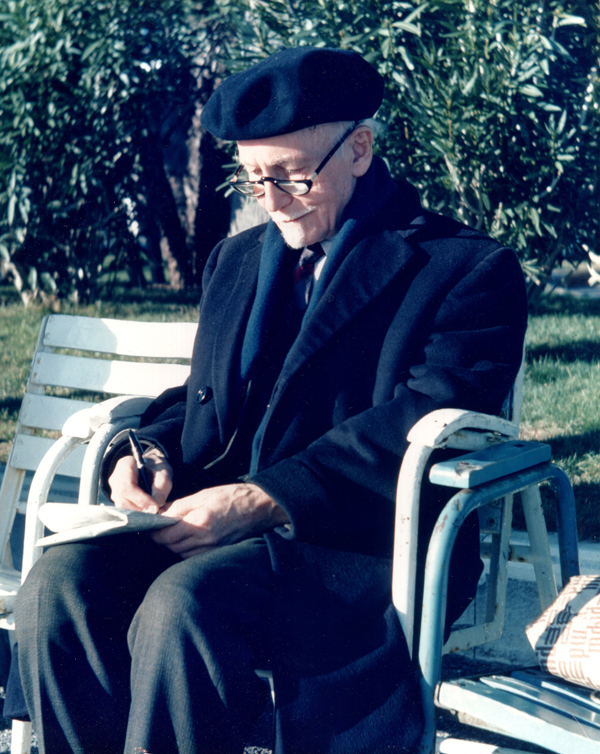

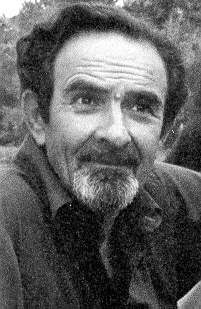


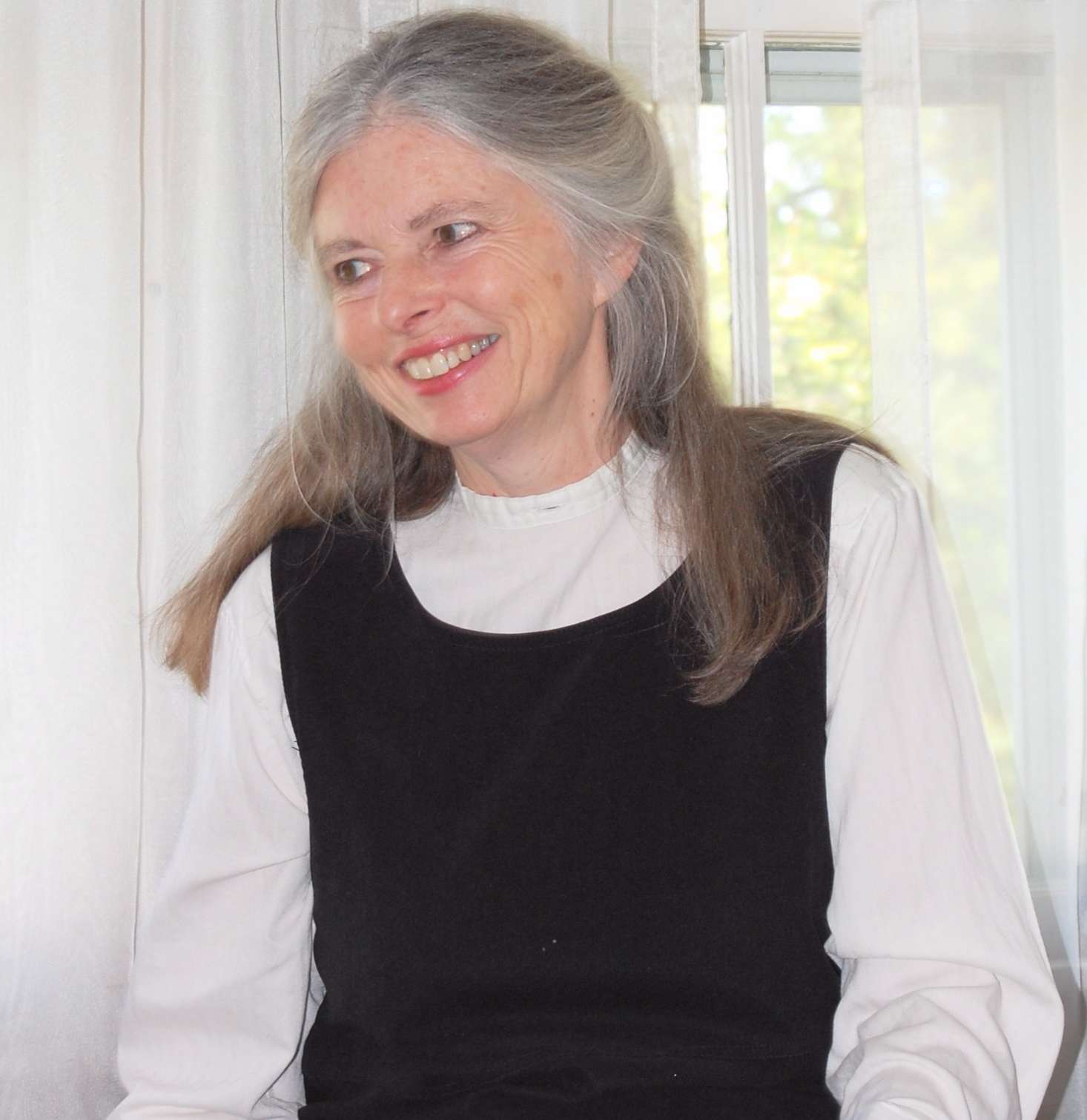

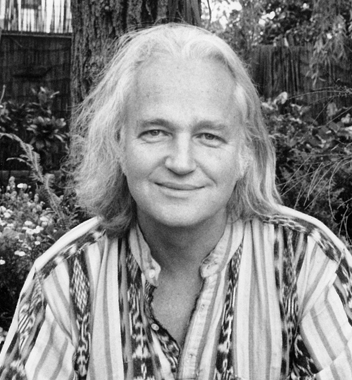
.jpg)
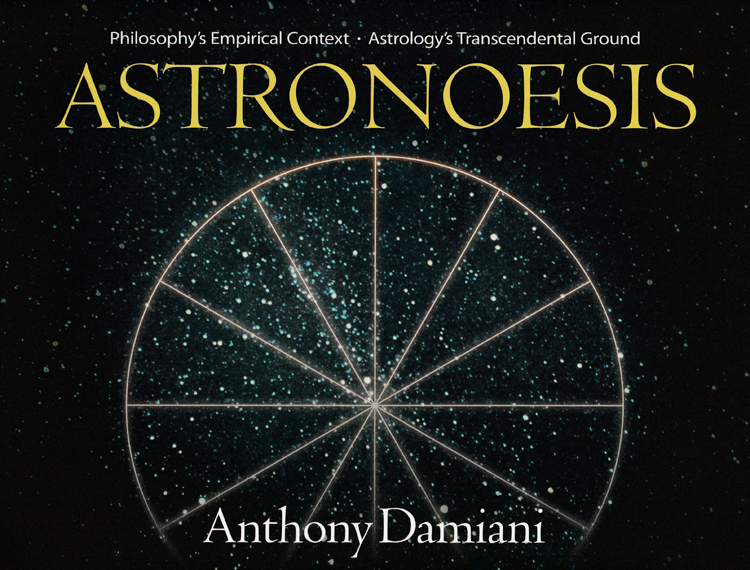
.jpg)
.jpg)
.jpg)
.jpg)
.jpg)
.jpg)
.jpg)
.jpg)
.jpg)
.jpg)
